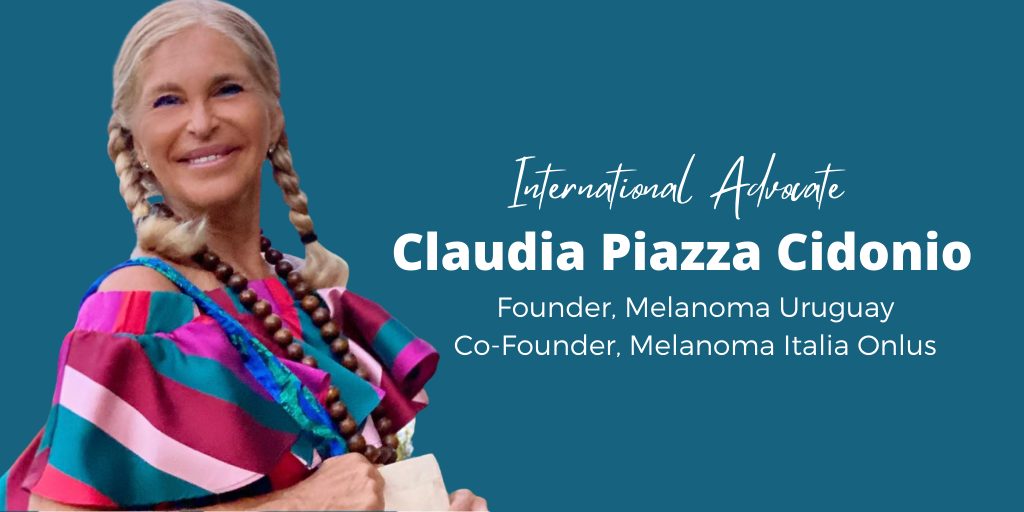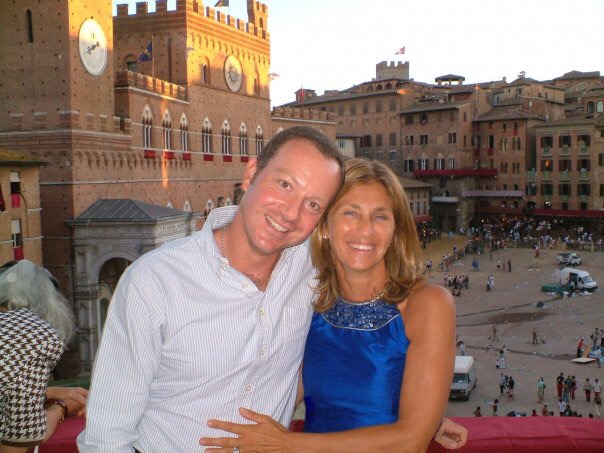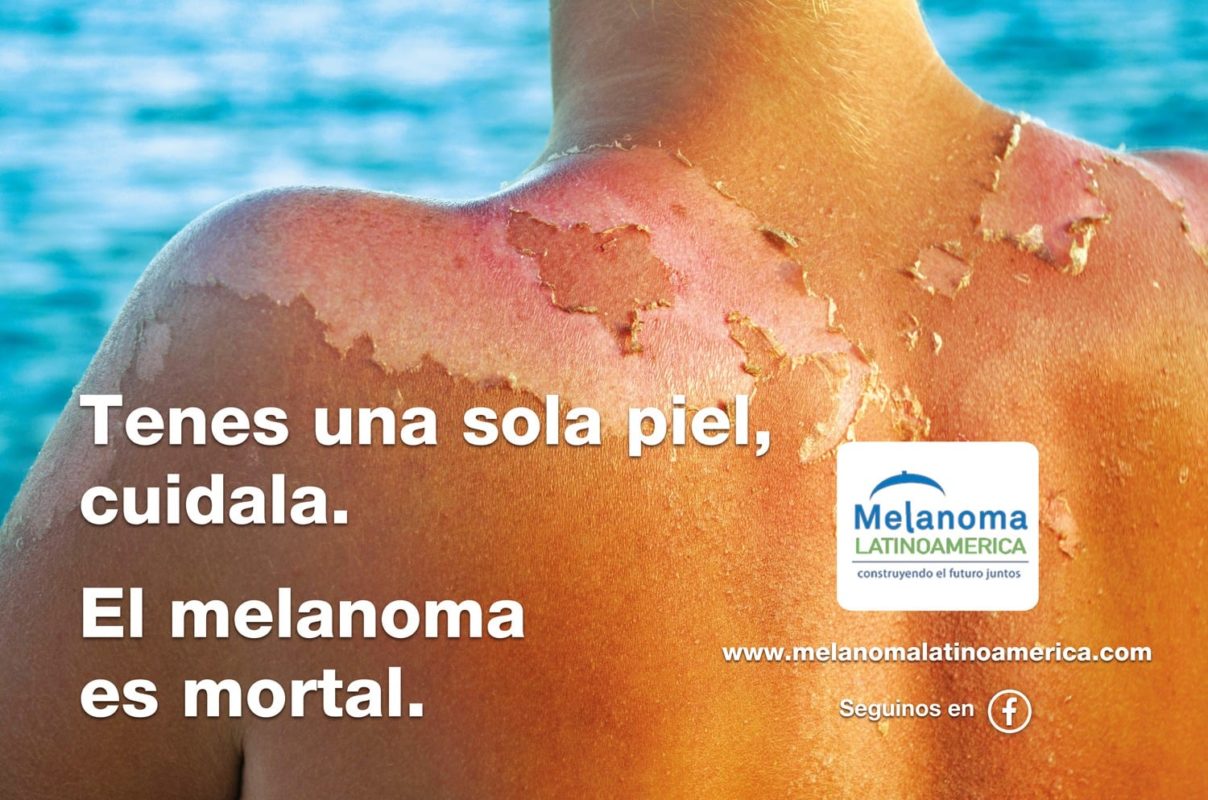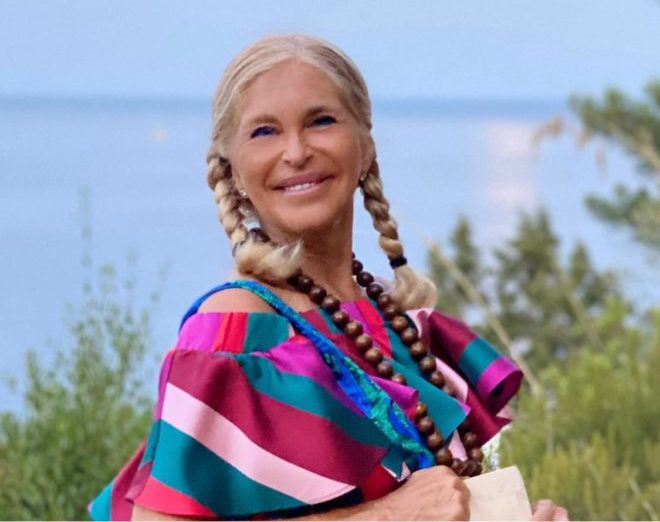International Advocate Spotlight: Claudia Piazza Cidonio

by Mara Klecker
Most of Claudia Piazza Cidonio’s family studied medicine and went on to become doctors – something she was never interested in. She is a designer and studied social communications and art history. Her path toward understanding melanoma and advocating for melanoma patients has little to do with her personal interest, she says. Rather, she’s fueled by a sense of duty and a desire to honor her husband, Pierluigi, called “Pucchio,” who died of melanoma in 2007 at age 37. The couple’s son and daughter were just 9 and 12 then and the family was living in Italy. After her husband’s death, Claudia moved to her home country of Uruguay.
“Melanoma is a devastating thing for the family and the patient,” Claudia said. That’s why she’s dedicated to spreading awareness to help prevent melanoma and provide resources to families facing the disease in Italy and Latin America.

Pucchio & Claudia
“For me, this is a sacrifice. I never wanted to do it, but it is necessary,” Cidonio said about her role as founder of a melanoma advocacy group in Uruguay and co-founder of one in Italy, both members of AIM at Melanoma’s Melanoma International Patient Advocacy Coalition, or MIPAC. Claudia also is a member of the World Congress of Melanoma.
Melanoma Uruguay/Latin America and Melanoma Italia Onlus were officially founded in 2014, though Claudia’s advocacy work started before then.
In searching for treatment options, Claudia and Pucchio were connected with Dr. John Kirkwood at the University of Pittsburgh Hillman Cancer Center. They flew from Italy to see him and Pucchio began a clinical trial that he was ultimately taken out of when the melanoma returned shortly after.
Claudia kept in touch with Dr. Kirkwood, who then connected her to Valerie Guild, the late founder of AIM at Melanoma.
“Valerie really is my guide,” Claudia said. “She was a person who cared for every patient in every part of the world. She was capable of finding a doctor or a treatment for compassionate use and transmitted positive thoughts to everyone, everywhere. That is the way a patient advocate has to treat patients – with all of that heart and education.”
Italy and Latin America proved “two different worlds” when Claudia started her organizations. In 2014, chemotherapy was the only treatment option for melanoma patients in Uruguay, Claudia said. Italy, however, had approved immunotherapies and targeted therapy. One of Claudia’s objectives was to have those therapies available for advanced melanoma in Uruguay, where they were finally approved in 2019.
Still, in both countries, Claudia knew she faced the challenge of getting people to understand the danger of melanoma.
“People think it’s nothing more than a mole,” she said. “That’s what we have to create awareness about – that this is cancer.”
One of Claudia’s awareness campaigns features a photo of a young boy with peeling skin from a severe sunburn. The message tells parents that if their child gets a sunburn, they are putting them at risk for life-threatening cancer. More than 1.8 million people–at least two-thirds of the country’s total population–have seen the ad in Uruguay.

“The best thing we can do is help people avoid melanoma,” Claudia said.
That’s why she does the work she does, which she said is made easier with the connections of MIPAC and the international network of melanoma patient advocates.

“We know we can help patients wherever they are and that is a very good feeling,” she said.
Though it’s not what she thought she’d spend her life doing, Claudia said she believes Pucchio would be proud of her work and the courage it took to pursue it in two different parts of the world.
“I feel like he wants me to do this,” she said. “What makes me proud is what my kids once told me. They said: ‘Mom, keep on doing it even if it makes you suffer because this is probably the most important thing you’ll ever do in your life.’ It’s hard sometimes, but I know it’s the best thing I can offer the world.”
You can reach Claudia via email here.
Recent Posts

The Cost of Sunscreen May Be Costing Lives

A Conversation with Dr. Rena Szabo, PsyD on Empowering Patients

Empowering Women in Melanoma: A Look Inside the Women in Melanoma Initiative

Melanoma News and Highlights You Don’t Want to Miss


